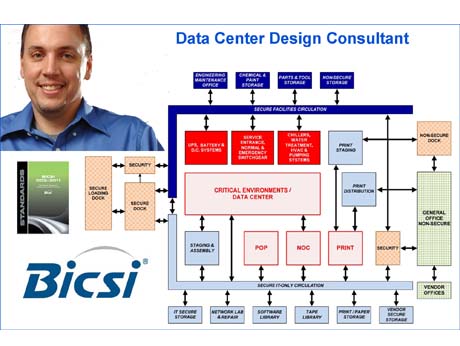
BiCSI ties up with Pearson to bring Data Centre Design Certification to India: Opens up avenues for Data Centre professionals in India, to leverage burgeoning demand for private cloud management.
Bangalore, February 27, 2012:
Indian computer professionals, who have what it takes to help meet the burgeoning demand for data centres driving the private cloud business in the country, can now aspire for globally recognized certification. BICSI, the not-for-profit association supporting the international information technology systems (ITS) industry with information, education and knowledge, has tied up with Pearson VUE, the global leader in computer-based testing for information technology, academic, government and professional testing programs, to bring its industry-recognized Data Centre Design Consultant credential examinations to India. Due to the push for greater capacity, increased efficiency and higher levels of utilization, data centres have become more complex to design and bring online. Today’s data centre designers are often required to possess knowledge in mechanical, electrical and telecommunications systems, as well as being familiar with the other needs of a data centre, such as reliability, security and building requirements. The BICSI Data Centre Design Consultant (DCDC) was created in 2011, to recognize those individuals who have demonstrated both the knowledge and ability to apply it over the multiple facets within data centre design. Candidates for the DCDC designation are individuals involved in the planning, implementing and making of critical decisions regarding data centres. Data centre, IT, facility or project managers, architects, engineers, designers, consultants and those planning to enter careers in the data centre design, construction or maintenance fields would benefit from earning the DCDC credential. BICSI data centre design consultant courses serve as a career path for those seeking advanced knowledge in this area. Several courses are recommended for candidates preparing to take the DCDC examination.
In addition to the recently announce DCDC certification, BICSI also offers certification opportunities to ITS professionals in the field of Electronic Safety and security, Network communications, ITS design fundamentals, ITS installations, ITS project management and not to mention the most coveted credential of all RCDD.
Says Dileep Kumar, Chairman, BICSI India District: “The BICSI Data Centre Design Consultant credentials will prove to be a valuable passport for those who want to be a key part of the exciting ecosystem that is developing in India, around the cloud – particularly private and hybrid clouds. The Private Cloud in India is expected to deliver up to 50% saving to Indian enterprises creating in the process, 100,000 additional jobs by 2015 according to a study* by Zinnov Management Consulting. The total cloud market in India, currently at US$ 400 million will grow tenfold, to reach a market value of US$ 4.5 billion by 2015. The BiCSi DC Design Consultant qualification thus may be a key differentiator which will add a respected global credential to your own work experience in data centres”. (* “Private Cloud Landscape in India”/ Zinnov Consulting 2011).
To sit for the DCDC credential examination, you must have a minimum of two years of approved and verifiable experience in the design and/or construction of data centres. Experience must be within the last six years.
The Data Centre Design Consultant exam is based on content found in BICSI 002-2011, Data Centre Design and Implementation Best Practices, BICSI's Network Design Reference Manual (NDRM), 7th edition (Chapters 1-4 and 7) and Electronic Safety and Security Design Reference Manual (ESSDRM), 2nd edition (Chapters 3 and 13). Appropriate chapters from the NDRM and ESSDRM are available as a download as the Network Systems and Commissioning (NSC) reference.
The examination is administered in a computer-based testing (CBT) format at Pearson VUE Authorized Training Centres worldwide. Details on examination requirements for other BICSI credentials and certifications are available on the BICSI website www.bicsi.org
The first such computer-based DCDC examination was held worldwide on February 13. The exam format consists 2 hours, 100 questions, closed-book and multiple choices. Once the candidates’ application is approved, he or she will receive an email confirming approval. Notification includes the required candidate ID Number and scheduling information. Candidates can schedule their exam a www.pearsonvue.com/BICSI . They will have up to one year to pass the examination after their application has been approved.
Dozens of test centres have been created in India. These include all major branches of IT training leaders like NIIT, AIM and Everonn. Nearest centres can be found here: http://www6.pearsonvue.com/Dispatcher?application=VTCLocator&action=actStartApp&v=W2L&cid=748
Link for DataCentre Design Consultant’s exam details: http://www.bicsi.org/programs.aspx?l=5626&r=5620&c=dcdc
Link for PDF with Course outline: http://www.bicsi.org/uploadedFiles/PDFs/Applications/DCDC-Exam-Content-Outline.pdf
Link to Data Centre Design handbook ANSI/BICSI 002-2011, Data Centre Design and Implementation Best Practices Released March 15, 2011 with updates to the Electrical and Telecommunications sections http://www.bicsi.org/book_details.aspx?Book=BICSI-002-CD-11-v2&d=0
Link to Free PDF of sections 1-5: http://www.bicsi.org/uploadedfiles/BICSI_002_Sample.pdf
BICSI is a professional association supporting the information technology systems (ITS) industry. ITS covers the spectrum of voice, data, electronic safety & security, and audio & video technologies. It encompasses the design, integration and installation of pathways, spaces, fibre-and-copper-based distribution systems, wireless-based systems and infrastructure that supports the transportation of information and associated signalling between and among communications and information gathering devices.